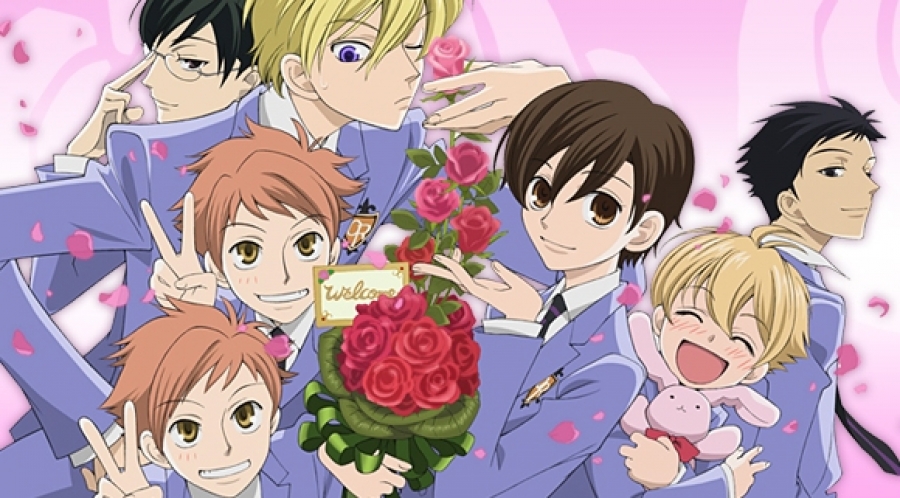The anime series Ouran High School Host Club, based on a manga of the same name, debuted in Japan in 2006 and was released in the US in 2009. The show is currently licensed through Funimation, and all twenty-six episodes can be streamed through their site, as well as numerous streaming services. I had heard about it many years ago, but I simply had so many things I was trying to read and watch that I didn’t get around to it. What a loss! This comedic series is one of the most fun and unique shoujo (marketed to teenage girls) anime I have come across in a long time.
High school freshman Haruhi Fujioka has managed to enter the elite Ouran High School on a scholarship, and she just wants to focus on her studies, so she can eventually become a lawyer like her late mother. One afternoon while searching for a quiet study space, Haruhi stumbles across a music room that has been transformed into a “host club,” a place where women come to find male companionship and emotional support. When she breaks a valuable vase, the androgynous young woman is forced to join the club to pay off her debt, and hijinks ensue.
Initially, I worried that Ouran would fall into the trap of a reverse harem where one girl is the object of lust for multiple young men. All of the host club members end up caring for Haruhi, but it grows out of shared experiences not poorly shoehorned plot devices. Also, I don’t think all of the boys are in love with Haruhi; they appreciate her as a person and for the insights into a “commoner” life. Given that it is a shoujo series, romantic elements crop up throughout the show, and it’s heavily implied that Tamaki, the president of the host club, falls for Haruhi in the first few episodes. Given his air-headed nature, the capricious second-year student can’t even recognize his own feelings and thinks he has fatherly intentions toward the newest club member!
All of the major characters start as stereotypes, but I loved how they get developed into three-dimensional individuals as the series develops. For example, Honey-senpai is portrayed as an adorable, blonde munchkin who loves bunnies and sweets despite being in his final year of high school. He could have been played as an emotionally stunted child, but skillfully placed episodes reveal that the diminutive, cute Honey is actually the heir to a martial arts school and is an accomplished fighter. Tamaki, Kyoya, the twins (Kaoru and Hikaru), and Mori also get character episodes that makes them into people not just dating sim tropes.
Cross dressing isn’t an uncommon theme for shoujo series, but Ouran is one of the first that doesn’t make it a huge issue. Haruhi’s androgynous appearance allows her to act as a host in the school club, so it’s important, but the act of cross dressing isn’t played for laughs unless it’s actually a really bizarre scenario. (See the first appearance of the Lobelia Zuka Club.) In fact, Haruhi states early on that she doesn’t understand the importance of being defined as male or female; it’s more important to have a sense of yourself as a person. The reason for her comfort with near gender neutrality is revealed later in the series, but I was stunned to see a shoujo heroine who wasn’t portrayed as an overly masculine tomboy or very feminine.
My only small complaint with the gender issues presented in Ouran was the use of “tranny” as a translation for “okama.” Admittedly, okama is a difficult word to use in English; I’ve heard it used to describe a very feminine gay man, any gay man, or a cross dresser; however, tranny is a touchy word in English, and while it wasn’t derogatory in the show, I still felt a little uncomfortable.
The art work for Ouran High School Host Club closely mimics the original manga, and it’s not anything extraordinary. It works to tell the story, which is really the many focus of this series. Similarly, while I found the opening and closing theme songs catchy, I fast forwarded through them most of the time. For me, they were just standard J-pop TV theme fare.
I definitely recommend Ouran, if you enjoy good storytelling, comedy, and interesting gender dynamics. It’s a concept that really shouldn’t have worked (Seriously, what high school would allow students to form a host club as an extracurricular activity?), but somehow it charms, entertains, and garners some genuine laughs as the main characters grow through the school year.
4.5 Cases of Renge Raising a Machine-Powered Platform in a Random Floor out of 5

